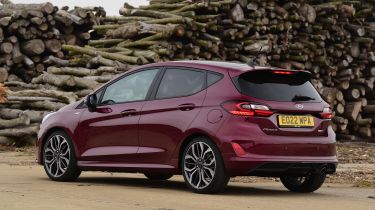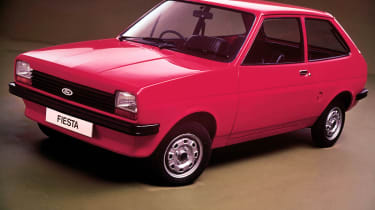End of an icon: Ford Fiesta cancelled
The best-selling car in British history faces the chop in June 2023 as Ford electrifies its range

- Production due to cease in June 2023
- Ford also cancels S-Max and Galaxy MPVs
- Manufacturer to concentrate on electric cars
After widespread rumours, it’s finally been made official: the Ford Fiesta supermini has been axed. Ford has confirmed its once best-selling model will cease production in June 2023 as the firm shifts its focus to becoming an all-electric manufacturer by 2030. While it’s unconfirmed exactly when order books will close, buyers looking to secure one of the last-ever Fiesta models should still have a few more months to make their purchase.
President of Ford Europe, Martin Sander said: “At Ford in Europe, we are accelerating our efforts to go all-in on electrification with our passenger vehicles being fully electric by 2030 – and all vehicles across our Ford portfolio by 2035. As we get ready to transition to an electric future, we will [also] discontinue production of S-Max and Galaxy in Valencia, Spain in April 2023”.
 The best small cars and superminis in 2025
The best small cars and superminis in 2025
Currently in its seventh generation, the original Mk1 Ford Fiesta was launched in 1976. Over the subsequent decades, almost every person in Britain has owned, learned to drive in, or been a passenger in a Fiesta, highlighting the nameplate’s popularity. The Fiesta is the UK’s best-selling car ever, with nearly five million cars sold over its 46-year lifespan.
However, this winning form dipped in 2021, with the Fiesta failing to appear in the UK’s top 10 sales chart. This has continued into 2022 so far, as supply shortages have hampered the manufacturing of the popular supermini. Ford has instead focused on building its fashionable and more profitable Fiesta-based Puma crossover, which currently sits in third spot in this year’s top seller’s list, with 27,680 registrations. An electric version of the Ford Puma is due to arrive by 2024.
The most popular car in the UK so far in 2022 is the Vauxhall Corsa – the Ford Fiesta’s main rival – which has shifted 29,342 units. Alongside the conventional petrol model, Vauxhall’s supermini is already on sale with an all-electric powertrain, badged Corsa Electric.
 Ford Fiesta – the story so far
Ford Fiesta – the story so far
The Fiesta’s fate could have been sealed by the decision to turn Ford’s Cologne plant in Germany, where the car is currently built, into an EV manufacturing hub. This will produce electric Ford models based on the Volkswagen Group’s MEB platform, thanks to a collaboration between the two automotive giants.
What does this mean for car buyers?
This news may come as a shock to many as the Fiesta has long been a staple of British roads. However, with the increase in popularity of SUVs and electric vehicles, as well as ongoing supply chain issues, the beloved supermini’s future has looked increasingly shaky. Of course, the departure of the Fiesta means there’s one fewer affordable new car available to UK buyers; Ford and other mainstream manufacturers will need to scramble to fill this gaping hole in the market in order not to isolate lower-income households. We can only hope Ford plans to release a spiritual electric successor to the Fiesta – perhaps under a different nameplate – which channels its predecessor’s aptitude for offering fun as well as value-for-money.
Read our in-depth review of the Ford Fiesta hatchback, or take a look at our guide to the Top 10 best superminis for 2022
Recommended

Suzuki’s new 10-year warranty is free – here’s how to get it
Most Popular
Tips & advice

Car dashboard warning lights: what does each symbol mean?

Electric car charging stations: public networks, charger types, apps and maps







